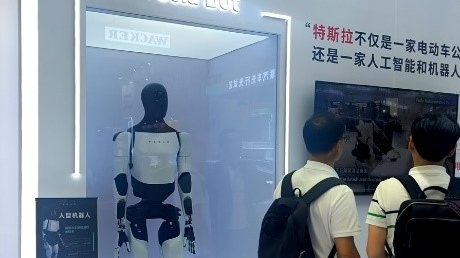
Visitors watch a Tesla Bot presentation video at Tesla's exhibition stand during the third China International Supply Chain Expo in Beijing, July 16, 2025. [Photo by Xu Xiaoxuan/China.org.cn]
Tesla is drawing attention this week at the Smart Vehicle Chain zone of the third China International Supply Chain Expo (CISCE) with its humanoid robot Optimus and Model Y vehicle, demonstrating the company's push to commercialize robotics technology developed for its electric vehicles.
First unveiled in October 2022, Optimus is now in its second generation with enhanced full-body control and better balance. The robot's walking speed has increased by 30% from its previous version, according to Tesla. Its 10 fingers now have tactile perception, allowing it to handle delicate tasks such as holding fragile eggs or lifting heavy boxes. Optimus can mimic human actions, including sorting batteries using a vision-based neural network.
Tesla sales director Yang Jingjing said Optimus is already performing practical tasks in Tesla factories, including moving batteries and other heavy items. The robot can even lift a piano weighing half a ton, she said. Tesla plans to market the robots for domestic chores in the future. Priced at under $20,000, Optimus is expected to enter mass production in 2026.
Tesla vehicles are equipped with A14 intelligent assisted driving hardware, featuring Tesla-developed chips that function like the human brain. These chips process environmental data from cameras and use advanced algorithms to analyze driving conditions and guide vehicle behavior. The same chip is integrated into Optimus, enabling it to learn continuously by updating its software in real time, improving recognition accuracy and operational efficiency.
This iterative learning system supports more advanced applications, including enhanced autonomous driving and expanding the robot's range of capabilities. Tesla says it aims to harness AI to boost productivity and free people to focus on higher-value tasks.
When asked why Tesla chose to develop a robot using the same architecture as its vehicles, Yang explained that as early as July 2016, the company changed its website from teslamotors.com to tesla.com, signaling a strategic shift beyond car manufacturing. Tesla sees itself not just as an electric vehicle maker but also as an artificial intelligence and robotics company.
Tesla's business now spans a broad range of sectors, with an integrated ecosystem that includes transportation, energy generation and storage, and AI computing, covering solar power, autonomous taxis and a global supercharging network.


 Share:
Share: 




 京公網安備 11010802027341號
京公網安備 11010802027341號